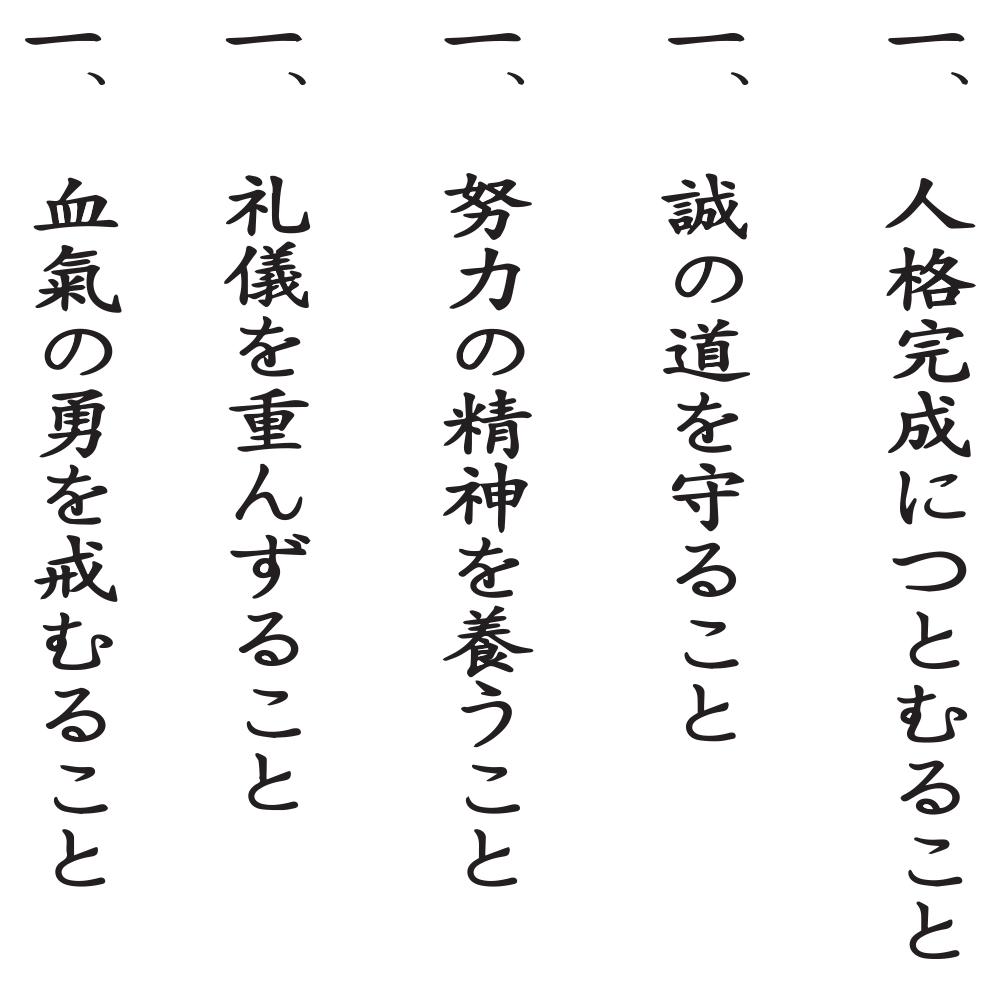The Dojo Kun (Rules of Karate-Do)

The Dojo Kun, also known as the Dojo Oath or Dojo Rules, is a set of guiding principles and rules followed in traditional martial arts dojos, including Shotokan Karate. The Dojo Kun serves as a code of conduct for practitioners and reinforces the values of respect, discipline, and humility. In Shotokan Karate, there are usually five principles in the Dojo Kun.
One: Seek perfection of character
One: Be faithful
One: Endeavor
One: Respect Others
One: Refrain from violent behaviour
Hitotsu. Jinkaku Kansei ni Tsutomuro Koto.
Hitotsu. Makoto no Michi wo Mamoru Koto.
Hitotsu. Doryoku no Seishin o Yashinau Koto.
Hitotsu. Reigi o Omonzuru Koto.
Hitotsu. Kekki no Yu o Imashimuru Koto.
Understanding the Dojo Kun
1. Seek Perfection of Character - This is the ultimate goal of karate. To accomplish it, you must apply your training to your life. When training, always follow proper principles. Emphasise not only physical improvement but also mental improvement. If you follow proper principles, you acquire experience that you can apply to everything else. The following four rules are necessary to show how to accomplish the overall goal.
2. Be Faithful - Keep to the proper direction. Keep on track. The seeking of truth and fairness is equivalent to seeking the essence of character. Proper technique and action must be based on proper thinking. Develop yourself inside; don't worry about appearances; be true to yourself. As for your attitude and performance, have an open mind, be humble, and never forget your responsibilities based on your rank. Technique and character reflect the image of Karate-Do.
3. Endeavour - Maintain constant effort. "Practice doesn't make perfection; Correct Practice makes perfection". Hard work underlies the improvement principle. - "No Pain, No Gain". Seek extra stimulation for extra improvement. Seek more profound and higher levels of understanding. Overcome your weakness and learn self-control. Learn your limitations. The quality of the process is essential, not only the result. Continuous effort is power. Be patient, only want a little, and do everything step by step.
4. Respect Others - Live together and improve together. We benefit from cooperation. Group spirit helps the individual keep going. Cooperation means training each other. The bow symbolises respect - it strengthens relationships, controls selfishness, and doesn't get a big head. Respect other dojos and systems - everyone benefits from mutual respect and cooperation
5. Refrain from Violent Behaviour - Show Confidence. Learn Self Control and proper application of energy. Control a hot temper. Use technique, not just energy.
Book a Free Trial Class at Bushido Karate Club
Bushido Karate Club is currently accepting new members. Contact us today to book a trial class in Douglas or Carrigtwohill and begin your karate journey. Places are limited so call today to avoid disappointment.
Tel: +353876307006






